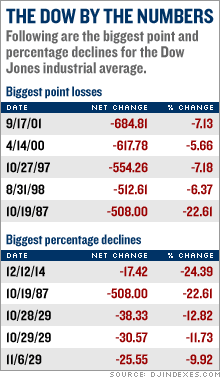Survive a market drop - and make it work for youLosing money never feels good. But keep things in perspective and you can boost long-term returns.NEW YORK (CNNMoney.com) -- It takes nerves of steel to shake off a big stock drop - even conservative index-fund investors take a hit. But the world's best investors not only shake them off - they thrive on them.  They know sell-offs are common, perfectly normal (see table), and even healthy. When stocks go way up in a hurry, their prices become unrealistically high. Only by falling occasionally (and even sharply) in the short run can stocks continue to rise in the long run - without the agony of today's drop, the ecstasy of tomorrow's good returns becomes impossible. Consider the terrible slide of 1973-74, when the S&P 500 index lost 48 percent of its value. Richard Nixon had resigned the Presidency, oil prices had quadrupled, Cleveland and New York City were on the verge of bankruptcy, and inflation had flared up to 12 percent. If ever there's been a good time to panic, that had to be it. But as the old saying goes, things are darkest before the dawn. If you'd sold out of stocks at the end of 1974, you would have missed 1975's 37.2 percent return and 1976's 23.8 percent gain - two very strong years for the stock market. Even after the Dow's wrenching plunge in Oct. 1987, remember that the index actually ended up rising 2 percent in value that year. And it took only 15 months (until January 1989) for the Dow to make its way back above 2246.73, the closing price on the last trading day before Black Monday. In fact, there's such a thing as paying too much attention to your money. In the late 1980s, Paul Andreassen, a psychologist then at Harvard University, conducted a series of laboratory experiments to determine how investors respond to financial news. He found that people who pay close attention to news updates actually earn lower returns than people who seldom follow the news. When you think about this a little more, it actually makes good sense. News coverage tends to make market movements seem even bigger than they are - and to make them seem likely to persist just when they are most likely to reverse. Take action Fortunately, there are several simple and effective steps you can take to turn a stock market crash to your advantage. Amp up your 401(k). Since a down market can be a great time to buy solid investments at bargain prices, contribute as much to your 401(k) as you can, because you'll be picking up more shares for the money, which will pay off when the market rebounds. If you can't contribute the maximum your plan allows, at the very least contribute as much as is required to receive the company match. Typically, companies match 50 cents on every dollar you contribute, up to 6 percent of your compensation. That means for each dollar you invest up to 6 percent, your employer adds another 50 cents, instantly transforming your investment into $1.50. This will not only help cushion any fall in stock prices, but it will amplify your gains once the market recovers. Adjust your risk. A market sell-off is a good time for a gut check. Did the mutual funds you own take too much risk and fall much more than their respective indexes? Obviously you would have wished you'd known before this decline. But at least you'll know which funds you want to ride into the next one. For a good selection of mutual funds with good risk profiles, see the Money 70, Money Magazine's selection of best funds. It's also a good time to make sure you have the right mix of stocks and bonds, which can add ballast to a portfolio during downdrafts. Even if you have a lot of years to go, a decent dose of bonds - say 10 to 20 percent - is a good idea: you'll still get a lot of the growth stocks offer without as much volatility. Determine your deadlines. Ask yourself when you will need the money you've invested. For example, if you have a newborn child, it's a good idea to invest some money to pay college tuition down the road - and you can put most of it in stocks, since 18 years should be long enough for the market to recover from a crash. But if you're about to make a down payment on your dream house, that money should go in a safer bucket, where a stock market crash can't hurt it; there, you want to hold mainly cash and bonds. Tuesday's drop was relatively small and you can still make those adjustments. Spread your bets. If all you owned was U.S. stocks or stock funds, the crash has just reminded you that being diversified is the best offensive - and defensive - weapon in any investor's arsenal. Even if you're young and like to take risks, you should have some cash, some bonds, and some foreign stocks, which, over the long run, will combine with your U.S. stocks to lower your risks without crimping your returns. ____________________ Money 70: Best funds to buy now Time to get your portfolio in balance Money Makeover: Money Magazine gives these savers a makeover |
|
